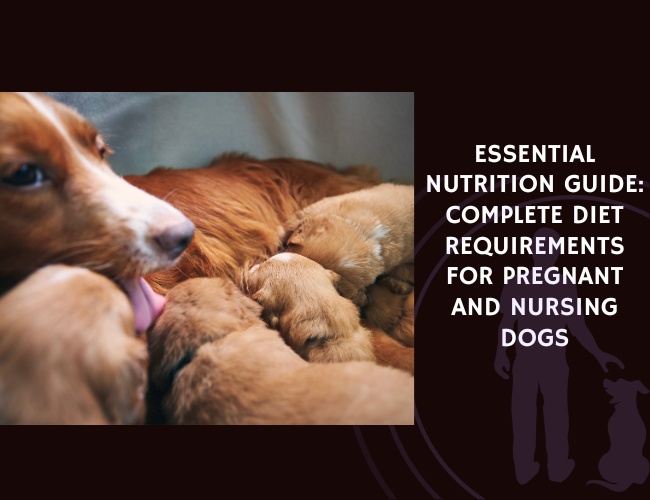Understanding Metabolic Changes During Canine Pregnancy
Increased Metabolism During Pregnancy
Pregnancy significantly impacts a dog’s metabolism, leading to an increased metabolic rate. During gestation, a dog’s metabolism can rise by approximately 15-25%. This heightened metabolic activity is a response to the growing demands of the developing fetuses and the physiological changes in the mother’s body. These metabolic adjustments necessitate careful nutritional planning to support both the mother and the growing puppies adequately.
Changes in Energy Requirements Throughout Gestation
As pregnancy progresses, a dog’s energy requirements evolve in various stages. Initially, during the early stages (weeks 1-4), maintaining a normal, high-quality diet suffices. However, by mid-pregnancy (weeks 5-6), it is essential to gradually increase the caloric intake by 10-15% to accommodate the growing energy demands.
As the pregnancy advances to the late stages (weeks 7-9), the energy requirements become even more pronounced. During this period, a significant increase in feeding, ranging from 30-50%, is recommended. This substantial boost ensures that the dog receives the necessary energy to support the rapid growth of the fetuses and the increased load on the mother’s body.
Impact of Breed Size on Nutritional Needs
Breed size plays a crucial role in determining the specific nutritional needs of a pregnant dog. Larger breeds, due to their overall greater body mass and the potential for larger litters, generally require more energy and protein compared to smaller breeds. For instance:
- Large Breeds: These dogs typically need higher caloric intake and protein levels to sustain their increased metabolic rate and support the development of multiple puppies.
- Small Breeds: While their overall energy requirements are lower than large breeds, the proportionate increase during pregnancy remains similar, highlighting the need for nutrient-dense diets to avoid excessive weight gain and related complications.
Understanding the specific needs of different breeds ensures that pregnant dogs receive tailored nutrition plans, optimizing their health and the health of their puppies.
By recognizing these metabolic changes and adjusting dietary plans accordingly, dog owners and breeders can help ensure the well-being of pregnant dogs and their future litters. Tailoring the diet to the specific requirements of different gestation stages and breed sizes is paramount in promoting a healthy pregnancy.
Next, we will explore essential macronutrients for pregnant dogs and how they contribute to fetal development and overall health.
Essential Macronutrients for Pregnant Dogs
Understanding the nutritional requirements for pregnant dogs is crucial to ensure the healthy development of the puppies and the well-being of the mother. This chapter focuses on the essential macronutrients – protein, fats, and carbohydrates – needed during canine pregnancy.
Protein Requirements
Protein is vital for tissue development, placental health, and the growth of puppies. Pregnant dogs need a diet composed of 25-30% protein. This high protein intake supports the growing fetuses by providing the necessary building blocks for muscle, skin, and other critical tissues. Proteins are essential for the mother’s health as well, playing a critical role in maintaining strong muscle tissues and overall bodily functions.
Importance of Fats
Fat should constitute about 15-20% of a pregnant dog’s diet. Fats are a dense source of energy and are especially important for brain development in puppies. Omega-3 fatty acids, such as DHA and EPA, found in fish oils, are crucial for the neurological development of the puppies. Including high-quality fat sources in the diet ensures both the mother and her pups receive the energy and nutrients needed for optimal development.
Role of Carbohydrates
Carbohydrates should make up approximately 50-60% of a pregnant dog’s diet. Carbs are essential for maintaining stable blood sugar levels throughout pregnancy, which helps prevent ketosis—a condition where the body burns fat instead of carbs for energy, leading to a dangerous build-up of ketones. Carbohydrates provide the necessary energy for both the mother and the growing puppies, making it easier to sustain the increasing energy demands as the pregnancy progresses.
Summary
Ensuring that pregnant dogs receive the correct balance of essential macronutrients is vital for the health of both the mother and her developing puppies. By providing a diet rich in protein, fats, and carbohydrates, we support fetal growth while maintaining maternal health. In the next section, we will explore the critical micronutrients and necessary supplements to further enhance the well-being of pregnant dogs.
Critical Micronutrients and Supplementation
Ensuring the health of your pregnant dog isn’t just about macronutrients like protein and fats; micronutrients and supplements also play a crucial role. Without adequate vitamins and minerals, your dog may face a whole host of developmental issues. Let’s dive into the specific micronutrients that are essential during this critical time.

Role of Folic Acid in Preventing Congenital Defects
Folic acid is a B vitamin critical in preventing congenital defects, particularly neural tube defects, in developing puppies. Ensuring your pregnant dog gets enough folic acid can aid in the proper formation of the fetal brain and spinal cord, significantly minimizing congenital risks. Include folic acid-rich foods like liver, green leafy vegetables, and eggs in the diet. In some cases, supplementation might be necessary for adequate intake.
Calcium and Phosphorus Balance for Skeletal Development
Calcium and phosphorus are the building blocks of healthy bones in both the mother and her puppies. A proper balance is key, as an imbalance can lead to conditions like eclampsia, which is characterized by low calcium levels (hypocalcemia) that can be life-threatening. Foods rich in calcium include dairy products and certain varieties of fish, whereas phosphorus can be found in meats and poultry.
It’s important not to overload one mineral at the expense of the other. Calcium supplements might be needed, but it’s best to consult your vet to ensure you’re not overdoing it. Over-supplementation can be just as harmful as deficiencies.
Importance of Iron and B Vitamins for Blood Cell Production
Iron and B vitamins (including B6, B12, and folate) are essential for the production of new red blood cells, crucial in a growing pregnant dog’s body. Iron helps in transporting oxygen throughout the body, benefiting both the mother and the developing fetuses. Iron-rich foods like meat, fish, and legumes should be staples in the diet.
B vitamins are equally significant for energy production, metabolism, and proper cell function. Foods like liver, fish, poultry, and whole grains are good B vitamin sources. An iron deficiency could result in anemia, leading to fatigue and overall poor health for both the mother and her puppies. Similarly, a lack of B vitamins can lead to metabolic issues and poor energy levels.
Understanding the demands of critical micronutrients during pregnancy equips you for better dietary management for your canine companion. Transitioning to the next stage-specific feeding adjustment, it’s evident that carefully balanced nutrition, combined with proper supplementation, sets the stage for a healthy pregnancy and lactation period.
By focusing on these essential micronutrients, you can help ensure the best outcomes for both mother and puppies.
Stage-Specific Feeding Strategies
Early Pregnancy (Weeks 1-4)
During the first four weeks of pregnancy, your dog’s diet should focus on maintenance with high-quality nutrition. There is no need to significantly increase caloric intake during this early stage. Ensuring that your dog continues to receive a balanced diet with adequate levels of protein (25-30% of the diet), healthy fats (15-20%), and carbohydrates (50-60%) will support her normal metabolic needs and prepare her body for the upcoming demands.
- Maintain normal diet: Keep feeding the same amount of high-quality food.
- Ensure balanced nutrients: Continue providing a well-rounded diet rich in protein, fats, and carbs.
Mid-Pregnancy (Weeks 5-6)
As your dog enters mid-pregnancy, the nutritional demands begin to increase to support the growing fetuses. Around this time, it’s essential to gradually increase the caloric intake by 10-15% to accommodate these changes. You may also consider incorporating a higher protein diet to support fetal development.
- Gradual caloric increase: Increase the daily caloric intake by 10-15%.
- Higher protein diet: Focus on increasing the protein content in their meals to support tissue growth and placental health.
Gradually increasing the caloric intake rather than making a sudden change helps avoid digestive issues and ensures the nutritional needs are met progressively.
Late Pregnancy (Weeks 7-9)
As pregnancy progresses to the final weeks, the energy requirements of your dog soar significantly. During weeks 7-9, you should increase feeding by 30-50%, focusing on highly energy-dense foods that can provide compact nutrition without overwhelming the dog’s digestive system. Given the increased nutritional needs, it’s crucial to ensure the diet remains balanced and rich in essential macronutrients and micronutrients.
- Significant caloric boost: Increase the daily caloric intake by 30-50%.
- Energy-dense foods: Choose foods rich in calories but easy to digest, such as high-quality puppy foods or special pregnancy formulas.
- Frequent feedings: Split the daily food into smaller, more frequent meals to improve digestion and nutrient absorption.
Transitioning to energy-dense foods during this period helps ensure that even with the increased caloric demands, your dog is getting sufficient nutrition without causing gastrointestinal distress.
Throughout the stages of pregnancy, closely monitoring your dog’s health and making necessary dietary adjustments is vital to support her well-being and the healthy development of her puppies. Remember, each dog is unique, and it’s always best to consult with your veterinarian to tailor the diet specifically to your dog’s needs.
Feel free to reach out if you have any questions or need further assistance on managing your dog’s diet during pregnancy. We’re here to support your journey with our expert services! 😊
Nutrition During Lactation
Lactation is perhaps the most demanding phase in a dog’s reproductive cycle, requiring a dramatic increase in energy intake. To effectively support milk production and maintain the mother’s health, we must focus on a few critical aspects: managing increased energy demands, ensuring a high-protein and fat-rich diet, and maintaining hydration and electrolyte balance.
Managing Increased Energy Demands
During lactation, a dog’s energy needs can skyrocket to nearly four times her normal intake. This increase addresses the energy required for milk production, which is essential for the puppies’ growth and development. Ensuring your dog receives adequate calories during this period is key. Here’s how to manage it:
- Gradual Caloric Increase: Start by gradually increasing the caloric content of her meals as soon as lactation begins.
- Frequent Feedings: Introduce smaller, more frequent meals throughout the day. This helps manage the increased energy requirements without overwhelming her digestive system.
- Energy-Dense Foods: Integrate foods high in calories and nutrients to meet the heightened demand without increasing the volume excessively.
Importance of High-Protein and Fat-Rich Diets
A high-protein and fat-rich diet is critical for milk production and the overall health of a lactating dog. Proteins are key for the development of body tissues, and fats provide the necessary energy. Here’s how to balance these crucial macronutrients:
- Protein Requirements: Aim for a minimum of 30-35% of the diet to be protein, sourcing it from high-quality animal proteins like chicken, turkey, or fish. Protein is essential for both the mother’s and puppies’ muscle development and overall health.
- Fat Requirements: Ensure that 20-25% of the diet consists of fats. Focus on providing healthy fats, including omega-3 fatty acids found in fish oil, which support neurological development in puppies.
- Balanced Macronutrient Ratio: Apart from protein and fats, the remaining diet should include about 40-50% carbohydrates to provide additional energy and maintain blood sugar levels.

Hydration and Electrolyte Balance
Maintaining proper hydration and electrolyte balance is just as crucial during lactation to ensure the seamless production of milk and the overall health of the mother. Dehydration can severely impair milk output and affect the mother’s well-being. Here are some key points to consider:
- Constant Access to Fresh Water: Ensure that the lactating dog has constant access to clean, fresh water. Provide water bowls in multiple locations to encourage frequent drinking.
- Electrolyte-Rich Foods: Include water-rich and electrolyte-containing foods, such as broth or specially formulated canine electrolyte solutions. This helps in maintaining the fluid-electrolyte balance crucial for milk production.
- Monitor Hydration Levels: Pay close attention to signs of dehydration, such as dry gums, lethargy, or reduced milk output, and address these promptly with increased fluid intake.
By meticulously managing these aspects, you can significantly support the energy demands, dietary needs, and overall well-being of the lactating dog, ensuring both the mother and her puppies thrive during this critical stage.
Common Nutritional Deficiencies and Prevention
Identifying and Preventing Calcium Deficiency and Eclampsia
One of the most critical nutritional deficiencies faced by pregnant dogs is calcium deficiency, which can lead to a serious condition known as eclampsia (postpartum hypocalcemia). Eclampsia usually occurs during late pregnancy or lactation when the demand for calcium is high. It’s essential to maintain balanced calcium intake throughout pregnancy to support skeletal development in the puppies and prevent eclampsia in the mother.
To prevent eclampsia:
- Ensure the diet includes enough calcium to meet the increased needs without over-supplying. Natural sources such as dairy products, bones, and specially formulated supplements can be beneficial.
- Monitor for symptoms of eclampsia such as restlessness, muscle tremors, and stiffness. Immediate veterinary attention is necessary if these signs appear.
- Regular blood work should be done during late pregnancy and lactation to ensure calcium levels are within the appropriate range.
Managing Protein Intake to Support Maternal and Puppy Health
Protein is a vital nutrient during pregnancy, supporting fetal tissue development and maternal health. Insufficient protein intake can affect the growth and development of the puppies and the overall health of the mother. For optimal fetal development, pregnant dogs should consume a diet comprising 25-30% protein.
Protein management tips:
- Include high-quality protein sources such as meat, fish, and eggs in the diet.
- Regularly evaluate the mother’s condition; indicators of protein deficiency include weight loss, poor coat condition, and decreased energy.
- Consult with a veterinarian to determine if additional protein supplements are necessary, especially in cases of visible deficiency signs.
Risks of Overfeeding in Early Pregnancy
While it’s important to ensure that pregnant dogs receive enough nutrients, overfeeding, particularly in early pregnancy, carries significant risks. Excessive weight gain can lead to complications during birthing, such as dystocia (difficult labor). Additionally, overfeeding can result in unnecessary fat gain, which can later make it difficult for the mother to maintain an ideal weight post-pregnancy.
To avoid overfeeding:
- Maintain a balanced and portion-controlled diet during the early weeks (weeks 1-4) of pregnancy, prioritizing quality over quantity.
- Monitor the mother’s weight and adjust feeding portions as necessary based on her condition and activity level.
- Gradually increase the food quantity following the mid-pregnancy stage (week 5 onwards), and more significantly in the late stages, to meet the growing nutritional demands without causing excessive weight gain.
Remember, balanced nutrition is key during all stages of pregnancy to ensure both the mother’s well-being and the healthy development of her puppies. Proper dietary management helps in preventing common nutritional deficiencies and ensuring a smooth recovery postpartum.
Post-Weaning Nutritional Recovery
After the intense period of pregnancy and lactation, it is crucial to ensure your dog transitions smoothly back to a maintenance diet, while continuing to support her recovery and overall health. This chapter will guide you through the necessary steps to achieve a successful post-weaning nutritional recovery.
Guidelines for Transitioning Back to a Maintenance Diet
As your dog completes the weaning process, her caloric and nutritional needs will gradually decrease. A slow and steady reduction in food intake helps prevent sudden weight gain and health issues. Here are some steps to follow:
- Gradual Reduction:
- Slowly decrease her food portions over a couple of weeks. This helps her body adjust without shocking her metabolism.
- Monitor her weight and body condition to ensure a balanced weight loss without compromising her health.
- Quality Over Quantity:
- Focus on maintaining high-quality nutrition. Even as the quantity decreases, the food should be rich in essential nutrients.
- Ensure that the diet remains balanced with appropriate levels of protein, fats, and carbohydrates.
Recommendations for Supportive Supplementation
While transitioning back to a maintenance diet, some supplements can aid in recovery:
- Omega-3 Fatty Acids:
- Continue incorporating omega-3 fatty acids to support her overall health, improve coat condition, and reduce inflammation. Fish oil is an excellent source of these essential fats.
- Probiotics:
- Probiotics can aid digestion and help maintain a healthy gut flora, especially after the stress of pregnancy and lactation.
- Multivitamins:
- A tailored multivitamin supplement can help fill any nutritional gaps, ensuring that your dog gets all the vitamins and minerals she needs.
Importance of Monitoring Maternal Health During Recovery
Post-weaning recovery is a critical period for both the mother and her puppies. Here are key aspects to monitor:
- Regular Veterinary Check-ups:
- Schedule regular visits to the vet to keep an eye on her overall health and catch any early signs of potential issues.
- Blood work and physical exams can help track her recovery progress.
- Watching for Eclampsia:
- Be vigilant about signs of eclampsia, such as muscle tremors, weakness, or disorientation. This condition can occur if calcium levels drop suddenly post-lactation.
- Hydration and Energy Levels:
- Ensure she has constant access to fresh water.
- Observe her energy levels, noting any unusual lethargy or hyperactivity.
By following these guidelines, you can help your dog smoothly transition back to a balanced diet while supporting her overall health and well-being. The journey through pregnancy, lactation, and post-weaning recovery is demanding, but with the right nutrition and care, both the mother and her puppies can thrive.



